In a similar way to other Golden Age writers, Ngaio Marsh was a reasonably prolific writer, writing 32 novels between 1934 and 1982. Again like other writers, it is hard to keep up the same standards; there are always going to be some not so good and possibly even terrible stories. But for the Marsh beginner, how do you decide which ones to pick? I know some people prefer to read series chronologically and sometimes due to the characters and plots this can be fundamental. However, I think with this particular series you can get away with not doing so and more importantly in this post I plan to give 5 suggestions for Marsh novels to try and I have tried to pick ones which span the series and show I think, Inspector Alleyn at his best (though I imagine some people will disagree with my choices). I am also going to suggest 5 books to avoid, though critics of Marsh would probably say there were more than 5!
5 To Try
- The Nursing Home Murder (1935)
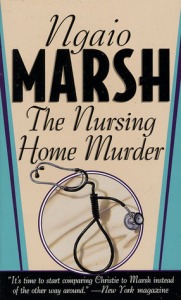
This is the third novel in the series. It centres on the death of a politician who dies shortly after an appendicitis operation. In true Golden Age style there are a plethora of people who wanted him dead within and beyond the operating team. I think this is the first strongest novel in the series as Inspector Alleyn begins to lose his Bright Young Things manner and I also think the setting of the crime and its’ set up was also well done. Deaths during and after hospital procedures is also a milieu utilised by later writers such as Green for Danger (1944) by Christianna Brand and P. D. James in The Private Patient (2008). In comparison to her first two novels A Man Lay Dead (1934) and Enter a Murderer (1935), the crime setup/ murder method seems more original and I would be interested if anyone reading this knows of any novels with a similar plot published prior to 1935.
2. Artists in Crime (1938)
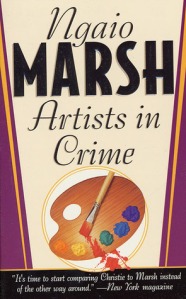
Critics such as Douglas Greene suggest that this is the novel where Inspector Alleyn discards his more flippant and ridiculous manner and instead becomes more serious and mature. Though as this part of character dies, the element of romance and love enters, as this is the book where Inspector Alleyn and his future wife, Agatha Troy, the artist meet. Agatha Troy is an engaging character, who although doesn’t get to do much sleuthing in her own right, still remains an independent and strong character, with a career of her own. Though murder and art do cross paves in the series, none more so than in this novel where Inspector Alleyn is called down to an artist’s colony where the artist’s model has been found murdered. All the members of the colony, including Troy are potential suspects in this mystery.
3. Surfeit of Lampreys (1941)
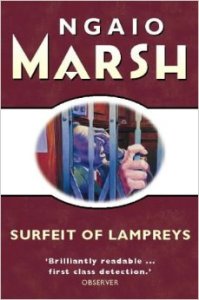
Like Dorothy L. Sayers’ Gaudy Night (1935), Surfeit of Lampreys is also a book which divides opinions and is Marsh’s marmite book, people either love it or hate it, so in a way it is an important novel to try in the series to see which camp you fit into. I enjoyed reading it (which definitely puts me in the minority group), as I think Marsh’s skills as a characteriser are showcased in this novel as they focus on one family, the Lampreys. Whilst reading Douglas Greene’s introduction to The Collected Short Fiction of Ngaio Marsh (1989), I was interested to read that the Lamprey family in the novel was based on friends she had in London and she even opened a shop called Touch and Go with some of them selling; ‘handcrafts… [and] funny rhymes for bathroom and lavatory doors’ (Greene, 1989: 8).
4. Scales of Justice (1955)

In a quiet country backwater murder is afoot when Colonel Cartarette is found murdered near a river, a setup which can also be found in Harriet Rutland’s Bleeding Hooks (1940). Again characterisation is very well done in this novel and I think the plot as a whole is strong. Often in Marsh novels, the setup of the crime is really good, only to then be followed by a dull investigation. However, I think in this story this is less of a problem, as the evidence and clues cast the net of suspicion widely, putting those with dark family secrets, an unpredictable archer and a rival fisherman potentially all in the frame of murderer. Although it was written outside of the Golden Age of crime, it still holds true to that style and the tropes involved.
5. Clutch of Constables (1968)
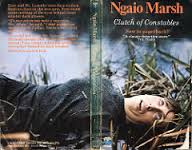
Having on the whole found Marsh’s books much poorer after 1960s, there are a few exceptions and this is one of them. A killer is loose on an English river boat cruise and again this book is one of the stronger later books in the series because Marsh sticks to what she knows best and that is writing a detective set within the Golden Age style. There is an eclectic group of passengers including Agatha Troy and what made this an enjoyable read was her more dominant role in the plot, being almost like Alleyn’s eyes and ears at some points.
Christmas Special
Tied up in Tinsel (1972)
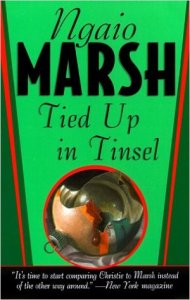
Though not in my 5 To Try, if you are wanting to start with a festive Marsh this December, you only have one choice, mainly because she only wrote one Christmas themed novel. However, this is another strong story from her later works and like Francis Duncan’s Murder at Christmas (1949), there is indeed a dead Father Christmas.
5 To Avoid
- A Man Lay Dead (1934)
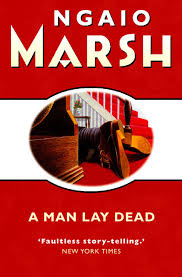
This first suggestion of Marsh books to avoid is actually supported by the author herself who in her autobiographical novel Black Beech and Honey Dew (1965) says how much she dislikes it, believing ‘that before or since… [she has] ever written with less trouble and certainly with less distinction.’ Personally I wouldn’t go as far as that and think there are far worse novels in her canon. I, like Douglas Greene, think what lets this book down is how much of ‘a twit’ (Greene, 1989: 8) Inspector Alleyn acts like and the tale including a Murder game gone wrong and even a Russian spy plot does seem a bit too ridiculous. Thankfully, Inspector Alleyn does improve with time. Interestingly, Marsh told an interviewer that she also disliked the title of this book, thinking it sounded ‘awfully like “A Man-Laid Egg.”
2. Death in Ecstasy (1936)
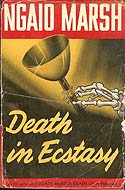
The murder investigation in this novel centres on a death in a religious order called the House of the Scared Flame. What made this novel a bit of a let-down was the ridiculousness of the setup as the milieu wasn’t expertly created and seemed a bit stereotypical and the presence of Nigel Bathgate (who is a journalist who appears only in some of the earlier novels such as A Man Lay Dead and occasionally gets involved in the cases), ensures that this book reverts to the farcicalness of the very first books and therefore weakens the plot and the characterisation of Alleyn.
3. Death and the Dancing Footman (1942)
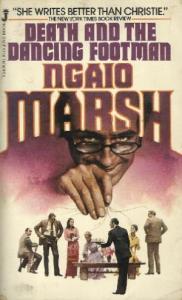
I think the main reason I selected this novel as one to avoid was because of the way it sets up your expectations high with its beginning, to only then really disappoint with the investigation and ending. The novel starts with Jonathan Royal explaining to his friend how he has invited people to his country home for the weekend, who all have reasons to loathe and hate each other. Mr Mandrake predicts that Jonathan has invited ‘stark murder to… [his] house,’ but Jonathan is eager to ‘let them enact their drama.’ This eagerness rather dissipates when the accidents start occurring and even worse they are trapped with each other due to the snow. Now on the face of it this is a good start, but the investigation which follows is not only dull, but is too rushed and due to quite significant information being withheld from the reader, Inspector Alleyn really does whip the solution to the case out of his hat. Moreover, having reflected on the book since reading it, I think the inclusion of the very literal dancing footman, doesn’t really add much to the story and is perhaps a throwback to the sillier nature of the earlier novels. A possible reason for why Marsh novels start great, but then flop is because of her artistic background. Douglas Greene writes that ‘her real interests were painting and the theatre,’ as opposed to a true detective fiction writer like Christie, meaning that ‘she brought to her writing the clearsightedness of an outsider – an outsider who could view a scene as a painter and plot with the dramatic sense of a playwright’ (Greene, 1989: 7). I certainly agree with the idea of her painter’s eye affecting her writing as I think it contributes to the strong starts of her novels. However, I am not so sure about her ‘dramatic sense of a playwright’ influencing her plots. Others such as Brad Friedman, who in his post ‘NGAIO MARSH: The Third Queen of Crime,’ has commented that Marsh’s plots aren’t really memorable, like those of Christie are and this may be due to lack of originality, but I also think it is because there is no sustainable tension or drama in the books, or if the beginning of the book has this, the investigation can very often kill it.
4. Spinsters in Jeopardy (1954)
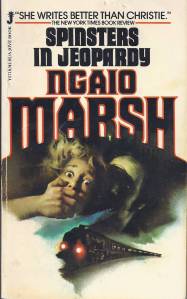
From the books I have read, this is definitely the worst book written by Marsh in my opinion. On holiday with his family, Inspector Alleyn in the Mediterranean is required to go back to work on what can only be described as the most ludicrous of cases, involving seeing a woman being attacked in a window from a train, Inspector Alleyn’s son being kidnapped, a wealthy woman dying in a remote and well-guarded villa with a creepy owner and lots of female nincompoops. Some may say that Marsh is trying to harness the gothic in this novel, but the results are catastrophic, with a poor show from beginning to end.
5. Photo Finish (1980)
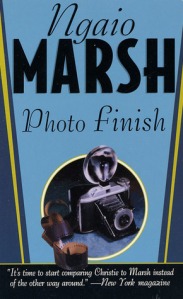
This is definitely one of the weaker novels published post 1960 and I think in contrast to novels such as Tied up in Tinsel, Clutch of Constables and When in Rome (1970), one reason it is a poor read is because Marsh tries to modernise and update her characters to fit the 1970/80s era, which is crystallised in poor Troy who must be quite old by this point wearing a jumpsuit. For me, Inspector Alleyn and Agatha Troy work best in the Golden Age world of the 1930s and 40s and Marsh’s poor attempt at changing this could only be topped if Christie had ever put Miss Marple in lycra. Furthermore, the plot itself was disappointing, with the investigation being painfully slow and undramatic, despite the hype which is created in the story about Inspector Alleyn’s plan to unmask the killer. The solution again was pulled out of a hat and wasn’t that interesting and the novel ends with vague and abstract thoughts on the countryside.
So hopefully I have directed you to some good Marsh novels and helped you to avoid the worst of them. As always let me know if you agree or disagree with my suggestions by commenting below.
So hopefully I have directed you to some good Marsh novels and helped you to avoid the worst of them. As always let me know if you agree or disagree with my suggestions by commenting below.
Veru useful, thanks.
LikeLiked by 1 person
Glad you found it useful. Have you read many Ngaio Marsh novels?
LikeLike
Not really. That’s why I find particularly useful your post and a good introduction
LikeLiked by 1 person
Very useful, thanks.
LikeLiked by 1 person
Ah, my favourite bugbear, Ngaio Marsh. Expert writer of the first half of many mystery novels, but exceeding dull writer of the second half. I managed to make myself decidedly unpopular when I dared question her suitability as one of the Four Queens of Crime, although it may have been suggesting Gladys Mitchell replaced her in the traditional quartet that garnered the mass intake of breath.
But her popularity does keep bringing me back to her and you’ve picked a couple as your favourites that I’ve given a good kicking to over on my blog.
Clutch of Constables has a great first half, especially with the lack of “Handsome” (ugh) Alleyn and the focus on Troy, but as soon as he shows up, she is packed off to the nearest hotel, ruining the development in the first half. Other than that cardinal sin, it’s not so bad that I didn’t return to Marsh relatively quickly, as this was the first time that I’d revisited her work for years.
But Surfeit of Lampreys is utterly horrible. The Lampreys are a repellant bunch of characters and the leeway that Alleyn gives them to play their silly games when there’s a murderer on the prowl frankly beggars belief – it makes him look like a complete idiot. And the plotting (and timing) of the murder is ridiculous. You’re not the only one who likes it but you can definitely count me in the “dislike” camp for this one.
But I will return to Dame Marsh at some point – I’ve got Artists In Crime on my shelf. Maybe next time Rich hits an appropriate year for Crimes Of The Century, I’ll bear your recommendations in mind…
Here are my Marsh reviews:
https://classicmystery.wordpress.com/category/authors/ngaio-marsh/
LikeLiked by 4 people
Did you question Marsh’s validity to be a queen of crime at the British Library conference? And to be honest Marsh is not a favourite writer of mine from the GA period, there are much better writers from that time, so when I picked my favourites it wasn’t like they were my favourite books of all time. A lot of people have said they find the Lampreys awful and its not like I liked them myself, but I think for me, I enjoyed how well Marsh created these irresponsible/ unlikeable characters. Out of my 5 to try the one with the best structure and puzzle is Scales of Justice (and being the Puzzle Doctor may therefore appreciate it a bit more). I noticed in your review on False Scent that a problem you have with Alleyn, is that he is so dull and bland and on that I would definitely have to agree with you.
LikeLike
“Expert writer of the first half of many mystery novels, but exceeding dull writer of the second half.” Magnificently well put, thank you. I know I’ll be quoting that!
LikeLike
You’re welcome.
LikeLike
Yeah, but…Mitchell instead? At least Marsh could muster half an interesting book at a time…
LikeLiked by 1 person
I enjoyed When Last I Died a lot and Speedy Death is fine too. At least she didn’t flog one formula to death (a formula that seemed to include “give up trying halfway through”) And nobody else has the volume of work for a Queenship…
LikeLike
Sad, but true (the Queenship point, not your taste in books). I suppose this is why the debate runs and runs. Still, Allingham over Mitchell any day, and Christie can have two berths if four queens are really needed. I wonder if ECR Lorac is any good, there must be someone who can nail the “Mitchell for Queenship” coffin closed…
LikeLike
Well, you have to shift Marsh off the fourth throne first. My comment at the Bodies From The Library was not popular (although L C Tyler told me later that he agreed with my dislike of Marsh).
LikeLike
Ohno, don’t drop L C Tyler in it, too! The poor man won’t get any rest at the next BftL now…!
LikeLike
As it happens, I just started reading a Marsh novel a few days ago: “Death at the Dolphin”. So far it seems like a good one. I really like the ones when she wrote about Shakespeare and the theatre, you can tell she really loved that environment. I am not particularly fond of her serial-sleuth Roderick Alleyn, he is just a bit too perfect and therefore a bit dull in my opinion, and as others have mentioned, once he enters the scene the novels tend to go down-hill. And yes, despite having read about a dozen of her books I can barely remember the plots of any of them. However I still find Marsh far more interesting than for example P. D. James. I gave up on James after a few books, but I am planning to read more Marsh.
LikeLiked by 2 people
I’ve never read that DATD before and I think you’re right about her being successful at recreating the theatre milieu. I have read all of P. D. James’ novels and I have to agree that by and large they weren’t that great, mainly because they are unnecessarily and painfully long.
LikeLiked by 1 person
I’ve read more of your ‘good’ ones than your ‘bad’ ones, which is promised, but as you’ll see from my entry this week, I did NOT like Lampreys on a re-read. I will look out for Clutch of Constables. (She did have good titles, you have to give her that.)
LikeLiked by 1 person
Ha, yes I noticed prior to posting that you weren’t keen on the Lampreys. I’ve had similar experiences myself with books when on first reading you like them and then on second or third you hate them. Happened to me with Jane Eyre, started off liking her but on re-reading I couldn’t help noticing every time she was snobbish and snooty to other people and a bit up herself, so the book was some what ruined.
LikeLike
I’ve only read one Ngaio Marsh novel to date (‘Died in the Wool’) which I have no memory of – never a good sign. I discovered at the back of my book cabinet a stack of Marsh novels which I bought off the back of a library sale, and 3 out of your 6 recommended titles were in there. Looking forward to dipping a cautious toe into the world of Marsh.
In terms of Crime Queens, although Christianna Brand’s best works can compete with Agatha Christie’s stronger titles, I suppose she hadn’t written enough to dethrone Ngaio Marsh…
LikeLiked by 1 person
I think a lot of people are wondering how Marsh got her throne. She’s not a writer I strongly urge people to read, as even her best ones just aren’t a patch on writers such as Christie or Sayers or Berkeley. Out of my 6 to try, Scales of Justice is probably the strongest in terms of plot, puzzle and structure.
LikeLike
Have read most of your good ones and very few of the bad – though I must read Spinsters in Jeopardy, what a wonderful title :-). I thought it was just me who found Marsh very patchy, so glad to know I’m not the only one. I find Michael Innes very similar, some great early novels, but the later ones, especially the dreadful Sheiks and Adders, best avoided.
LikeLiked by 1 person
Totally agree with Michael Innes, his work is very patchy indeed. Think my favourite of his was What Happened At Hazlewood.
LikeLike
Ah, that’s one I haven’t read yet. Must put it on my To be Read list.
LikeLike
I’m about to give up on Artists In Crime. I’ve got 3 triple novels that I thought I could read through and enjoy reasonably well, but I’ve had it. I find her pretentious, and far too verbose in some areas, and certainly writing about her own interests rather than actual crime, and those interests of course are theatre and painting. She is a snob not because of her interests, but because of the way she portrays her characters
.
I’m an artist myself, and I’ve looked up her own paintings, and find them about as wonderful as her novels. I’ve complained about Christie off and on, but she’s far better than Marsh, who just globs along with overdone personalities, I mean, how hysterical is the girl in the theatre novel going to be? None of it makes any sense. She jams the characters into her pretentious plotting
Alleyn is a reasonably good detective character, with echoes of Sherlock Holmes in his personality and mysterious upper crust background, but Marsh can’t leave that on the QT, she has to bring in the fact that he has a titled mother. Doyle did a better job of that, and didn’t push it on readers, because he wasn’t pretentious, and more interested in telling a detective story. And PLEASE, stop it with the Shakespeare and Latin quotes. One or two is fine. PG Wodehouse, who is a far more brilliant writer than Marsh, and whose books are just a touch away from being detective novels, always has Jeeves, of the servant class, make the Latin and Shakespeare quotes, but I don’t think Marsh can bring herself to portray a member of the aristocracy as a goof, because she is too much of a snob. Wodehouse also enjoyed lampooning writers of pulp fiction. He regularly took good humoured pokes at Christie with lines like “the butler was in the pantry reading an Agatha Christie”, but they ended up meeting and becoming good friends.
Marsh brings everyone into the same area for questioning by Alleyn, which doesn’t make any sense at all. Police don’t do that. People are questioned individually. So she’s shortcut the procedure to a Poirot scene where he’s already done the questioning, and is about to announce his findings. I can read Orient Express over several times and not get irritated, because the writing is better. Christie’s writing is spare, dry, and to the point. Marsh’s is suffocating. I’m fine with a closed set, but she makes it just claustrophobic, won’t let up on the overdone characters. What gets me is that she’s critical of Agatha Christie, where she has no room to be critical. She’s not perfect, but she’s definitely a plane above Marsh.
Spinsters in Jeopardy clearly takes its cue from The 4:50 From Paddington, with the crime/killing being glimpsed from a train, and then of course move on to a large, grand old house with a resident tyrant who is ill, and someone who’s involved with either drinking or drugs – and Marsh in my opinion really borrowed from that. The Spinsters is just terrible. She clearly had no clue about marijuana, and was too lazy to do any research, in fact I think laziness is a problem in her novels. It’s easier for her to go on, an on, and on about the theatre than it is for her to interview the police and do some real work on detective novels. The ‘cult’ trope was just lame as all getout, and no Yard officer is going to go undercover in that way, it was ridiculous.
My biggest problem though is her snobbery, and her pretentiousness. It resulted in her finding that the “outsider”, in Scales of Justice, the sexy woman of low origins was the killer instead of the resident aristos. That really surprised me, I thought for sure she’d be interesting and find fault in one of the toffs, but no, of course not.
Lazy writing.
I’m going to go dig up my books about Bryant and May, detectives of the PCU Division for re-reading, which are at least well done, very well researched, interesting, and provide a ton of information about London. Not in the slightest bit elitist.
LikeLiked by 1 person
Well if you have given a writer your best shot and their work is just not working for you, then it’s okay to switch your attention to other authors. I haven’t read a Marsh novel for years and I can’t say it is a decision I have regretted. I hope you get your reading mojo back swith the Bryant and May novels.
LikeLiked by 1 person
Remember that she got her Dameship for her work in theatre in NZ – not for her writing.
LikeLike